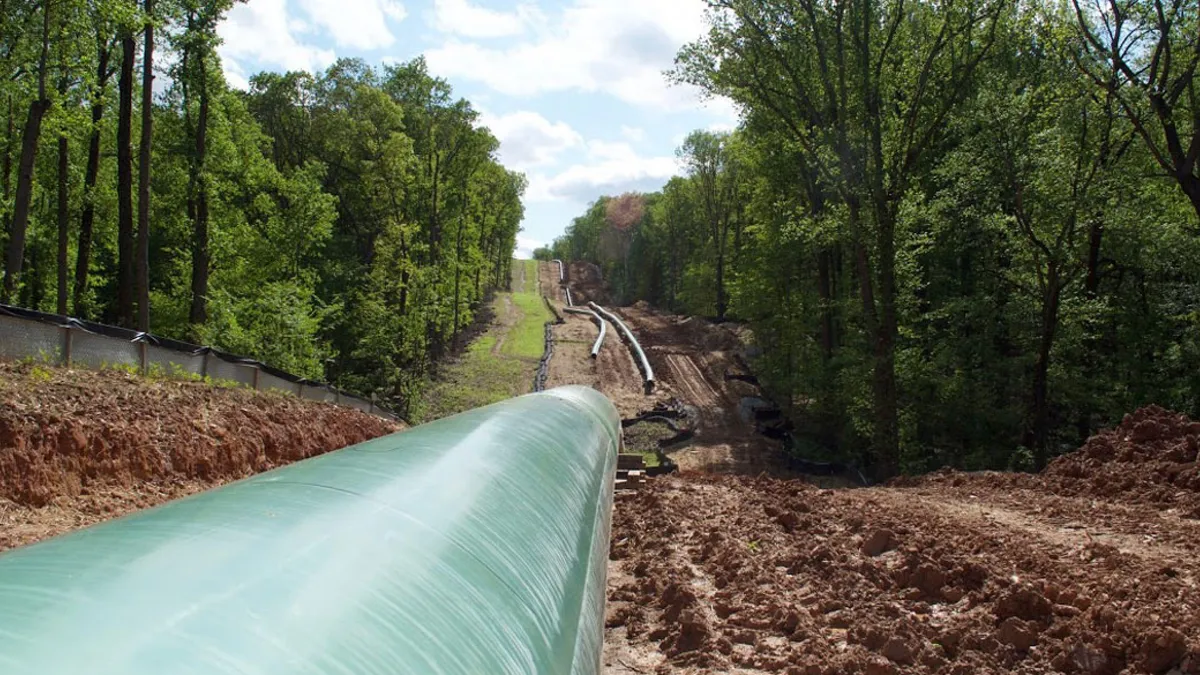Dive Brief:
-
Virginia utility regulators on Friday rejected Dominion Energy's long-term Integrated Resource Plan (IRP), a first for the state and utility.
-
The State Corporation Commission (SCC) said Dominion's long-term forecasts for energy demand are unrealistically high and the utility failed to model a number of electricity resources that could contribute to lower costs for customers or are mandated by law.
-
The ruling could raise questions about the Atlantic Coast Pipeline, since Dominion's load forecasts were a central justification for the proposed 600-mile gas line. Regulators gave the utility 90 days to file a revised IRP.
Dive Insight:
Rejection of Dominion's 2018 IRP, filed in May, represents enhanced scrutiny on the utility's operations and long-term planning.
Since it began reviewing them in 2009, the SCC had never outright rejected an IRP from Dominion, Virginia's only investor-owned utility and a powerful player in state politics. But in recent months, regulators have lent a more skeptical eye to some of the utility's plans, including an expensive offshore wind project mandated by state legislation.
The SCC's Friday order builds on those cost concerns, with regulators writing that the utility failed to model multiple power resources that could contribute to a least-cost planning scenario, like new natural gas-fired plants.
"[O]mitting a true least-cost plan does not provide the analysis needed to assess the incremental cost of various options, for Commission analysis, and for statutorily required reporting to the General Assembly," regulators wrote.
Dominion also did not include modeling for multiple resources mandated in Senate Bill 966, the legislation passed last year to reform utility ratemaking that included the offshore wind mandate.
"The Company did not ... model $870 million in energy efficiency programs, nor did it model a battery storage pilot required by Senate Bill 966," regulators wrote. "The 2018 IRP also did not include costs associated with the Company's Strategic Undergrounding Program ("SUP"), Grid Transformation Plan, or Transmission Line Undergrounding Pilot, each of which was contained in, or modified by, Senate Bill 966."
While Dominion can likely address those issues with new scenarios in an updated IRP, the SCC's rejection of the utility's load forecasts could present a more serious challenge to its long-term plans.
Expectations about electricity demand growth are central to evaluating any investment in power plants or grid infrastructure, and the SCC said it has "considerable doubt regarding the accuracy and reasonableness of the Company's load forecast for use to predict future energy and peak load requirements."
In particular, regulators pointed out that Dominion's load growth expectations are nearly double those of PJM, the regional transmission organization of which Dominion is a member.
"PJM's 2018 Load Forecast projects a peak demand 15-year compound annual growth rate ("CAGR") of 0.8% for the Dominion Zone of PJM, compared to the Company's internal forecast of 1.4%," regulators noted.
Revising the company's load forecasts could make some of its planned investments look unnecessary, like the Atlantic Coast Pipeline, a $7 billion project Dominion is building with two other large utilities, Duke Energy and Southern Co.
Dominion argues the line is necessary to supply gas to power plants it will build in Virginia as power demand grows, but environmentalists hope lower forecasts will change that calculus.
"[T]he State Corporation Commission has taken an important step in protecting ratepayers from rampant cost overruns associated with the high quantity of unneeded fracked-gas pipelines and plants that Dominion said it needed to meet its inflated load forecasts," the Virginia chapter of the Sierra Club said in a Friday statement.
Virginia and the Federal Energy Regulatory Commission have already approved the pipeline, slated to run from West Virginia to North Carolina, but last week a federal court put construction on hold over endangered species concerns. Dominion is pressing to have the stay lifted and in an emailed statement said it would comply with the SCC order.
"Friday's SCC order requires the company to make certain changes to the input assumptions to the original IRP filed on May 1st," said Dominion spokesperson David Botkins. "While we disagree with some of the changed inputs, we will make the required changes within the required 90 day schedule. We look forward to further demonstrating the benefits of grid transformation, renewable energy, and energy efficiency in combination with our natural gas investments."














